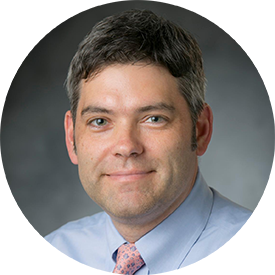
Michael J. Smith, MD, MSCE, decided to focus on pediatric infectious diseases following an elective during his residency. To this day, antibiotics and vaccines continue to be the focus of his research interests. In this week’s Faculty Spotlight, Smith talks to us about his clinical responsibilities, including medical directorship of the pediatric infectious diseases clinic and the pediatric antimicrobial stewardship program. He also shares how he’s adapting at work and at home to treat patients and care for his own children during the age of COVID-19. He believes that collaboration and building relationships with faculty in other divisions has been an essential strategy in adapting to this time of uncertainty.
How long have you been at Duke? How did you decide to come here?
I have been at Duke for almost three years (started August 2017). I had a mostly clinical job for my first 10 years out of fellowship but had the opportunity to be a site investigator for several Duke projects through the Pediatric Trials Network. I knew firsthand about the quality of research within the department, so when Duke opened up a new pediatric antimicrobial stewardship position, I jumped at the chance to join the team.
What were your pre-COVID responsibilities at Duke? What did a typical day for look like?
I have a 50:50 clinical:research work assignment. In addition to seeing patients, my clinical responsibilities include medical directorship of the pediatric infectious diseases clinic and medical directorship of the pediatric antimicrobial stewardship program. I am a member of the Antimicrobial Stewardship and Evaluation Team (ASET) and review pediatric antibiotic use at DUH on a daily basis and help develop guidelines for appropriate antibiotic use.
How has the COVID-19 pandemic affected your work? What’s one strategy you and your colleagues have used to adapt or compensate?
Part of my day job is to create guidelines for antimicrobial use – so my main focus over the past several months has been the development of guidelines for acute COVID infection as well as the post-infectious multisystem inflammatory syndrome in children (MIS-C). Unlike other guidelines, however, there are very few data to support these initiatives. It’s been a true challenge keeping up with and appraising the literature about COVID, and sorting through fact and fiction in the sea of press releases, pre-prints and social media posts about COVID.
I think collaboration has really been the most important strategy to adapt in this time of uncertainty. We’re all in this together. Given the protean manifestations of COVID, I have been able to build relationships with faculty in other divisions - ED, hospital medicine, critical care, rheumatology, cardiology, hematology/oncology and primary care – to make the best possible recommendations for children with COVID and MIS-C. Also, working with friends and colleagues at other institutions has been particularly helpful since other parts of the country were impacted by COVID before we were.
How and when did you initially become interested in pediatrics and pediatric infectious diseases in particular?
I had an awesome pediatrician growing up and went to medical school thinking I’d become a general pediatrician. However, I struggled with outpatient clinic in residency. Many of the parents had questions about vaccine safety (I was a resident right after the MMR-autism conspiracy surfaced) or whether antibiotics were needed for their children’s fever. I clearly needed to learn more about vaccines and antibiotics so did an infectious diseases elective. I was hooked and decided to pursue fellowship training. To this day, antibiotics and vaccines continue to be the focus of my research.
Is there any research you are doing or plan on doing?
Before I came to Duke I was funded by Kentucky Medicaid to measure outpatient antibiotic use and develop interventions to decrease unnecessary antibiotic use across the state. I have been fortunate to continue this work over the past three years and have expanded my outpatient stewardship work into North Carolina.
I am also involved in multiple industry and federally-funded vaccine and antibiotic trials (see above), including some new opportunities related to COVID treatment and prevention.
What do you enjoy most about your work?
I have the best of both worlds. I am fortunate to be working with leaders in pediatric and antimicrobial stewardship research, which is incredibly rewarding intellectually. But I’m also a kid at heart and enjoy working with children and their families and making them laugh when I can.
You completed your residency at Brown University and your pediatric infectious diseases fellowship at Children’s Hospital of Philadelphia--do you have any advice for trainees?
Find your passion. I love my job so it doesn’t seem like work.
How has the epidemic affected your life outside of Duke? What’s one positive strategy or resource you’ve found that helps you cope?
I am the parent of two children (3 and 10) who have been out of school since March, so as for many of us, it’s been a huge challenge. The biggest thing for me personally has been to give myself permission to be less productive than I’d like to be and used to be.
What passions or hobbies do you have outside of Duke?
Biking – and fortunately that’s one thing that we can still do during the pandemic! Sometimes I’ll go on a ride by myself for a mental health break, other times it’s a family activity and healthy way to spend time together. I also enjoy cooking and have found that to be another fun family activity during the pandemic.